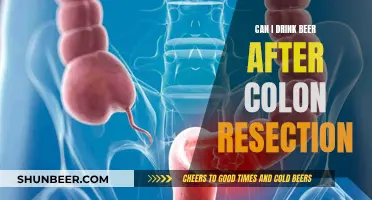
Drinking alcohol while taking painkillers is generally not advised, as it can lead to serious adverse reactions, including organ damage, loss of consciousness, and even death. The risks vary depending on the type of painkiller and the amount of alcohol consumed. Over-the-counter painkillers such as ibuprofen and paracetamol are usually considered safe to consume with moderate amounts of alcohol, but prescription painkillers such as opioids can have dangerous and even deadly effects when mixed with alcohol. It is important to follow the advice of a doctor or pharmacist when taking any medication, including painkillers, and to be aware of the potential risks and side effects.
| Characteristics | Values |
|---|---|
| Drinking beer after taking painkillers | It depends on the type of painkiller. |
| Ibuprofen and alcohol | Occasional use of ibuprofen with alcohol is not a cause for concern, but regular use can be harmful to your stomach and kidneys. |
| Acetaminophen and alcohol | Taking large doses of acetaminophen and mixing it with alcohol can lead to irreversible liver damage. |
| Naproxen sodium and alcohol | Naproxen sodium is generally safe to consume with alcohol, but it carries a risk of stomach bleeding. |
| Aspirin and alcohol | Mixing alcohol with aspirin can increase the risk of internal bleeding, stroke, or kidney failure. |
| Prescription painkillers and alcohol | Prescription opioid painkillers mixed with alcohol can be deadly. |
What You'll Learn

Ibuprofen and alcohol can cause gastrointestinal bleeding
Ibuprofen is a nonsteroidal anti-inflammatory drug (NSAID) that is readily available over the counter. It is designed to relieve pain, swelling, and fever. While occasional use of ibuprofen with alcohol is typically not a cause for concern, regular use can have serious health consequences.
Ibuprofen can irritate the lining of the stomach, and so can alcohol. When combined, they significantly increase the risk of gastrointestinal bleeding. A study of 1,224 participants showed that regular ibuprofen use raised the risk of gastrointestinal bleeding in people who consumed alcohol. People who drank alcohol but only used ibuprofen occasionally did not have this increased risk.
The risk of gastrointestinal bleeding increases with the amount of alcohol consumed. Heavy alcohol consumption is, therefore, particularly dangerous when combined with ibuprofen.
Ibuprofen can also cause gastric or intestinal perforation, which can be fatal. Long-term use of ibuprofen can damage the kidneys, and alcohol use can have the same effect. Together, they greatly increase the risk of kidney problems.
In addition, ibuprofen and alcohol are both central nervous system depressants. When taken together, they can cause excessive drowsiness, impaired coordination, and slowed reaction times. This can be especially dangerous when driving or operating machinery.
Beer and Covid: What's Safe?
You may want to see also

Tylenol and alcohol can lead to liver damage
Tylenol (also known as acetaminophen) is a medication used to treat mild-to-moderate pain and fever. It is metabolized by the liver and can be toxic to the organ when taken in high amounts or for extended periods.
When consumed in excess, alcohol can negatively impact the liver, increasing the risk of liver disease and acute liver failure. Combining Tylenol and alcohol can further elevate this risk. Both substances are broken down by the liver, and the presence of alcohol increases the production of a harmful substance derived from Tylenol, making it more challenging for the body to eliminate. This excess of harmful substances can lead to severe liver damage.
Chronic alcohol consumption can exacerbate the negative effects of Tylenol on the liver. Clinical studies indicate that even after alcohol is cleared from the body, its previous ingestion can heighten the risk of Tylenol-induced liver injury. This risk is particularly pronounced in individuals with alcohol use disorder (AUD) who overdose on Tylenol. However, it is important to note that there is no scientific evidence that individuals with AUD who take the recommended dose of Tylenol increase their risk of liver damage.
To minimize the risk of liver damage, it is crucial to follow certain precautions. These include adhering to the maximum daily dose of Tylenol (3,000 mg for adults), avoiding prolonged use without medical advice, and drinking alcohol in moderation (no more than three drinks per day). Additionally, it is important to be vigilant about checking the ingredients of other medications to avoid accidental Tylenol overdose and to refrain from taking multiple Tylenol-containing products simultaneously.
Helium Beer: Science Behind the Fizzy Beverage
You may want to see also

Prescription opioids and alcohol can be lethal
Drinking beer after taking a painkiller can be dangerous to your health. It depends on the type of painkiller you are taking. It is usually safe to drink a moderate amount of alcohol if you are taking over-the-counter painkillers such as paracetamol or ibuprofen. However, it is not recommended to drink alcohol if you are taking prescription-only painkillers such as tramadol or codeine. Doing so could increase side effects such as drowsiness and cause severe health problems.
Prescription opioids and alcohol can be a lethal combination. Alcohol can alter the metabolism and pharmacological effects of opioids, and opioids can alter the absorption and metabolism of alcohol. This can lead to several dangerous side effects, including:
- Increased risk of adverse events such as falls, driving accidents, and fatal overdoses.
- Respiratory suppression and overdose: Alcohol and opioids both suppress breathing and can lead to respiratory depression and even death.
- Increased risk of gastrointestinal bleeding and liver damage: Alcohol and opioids can increase the risk of gastrointestinal bleeding and liver toxicity, especially when combined with certain medications.
- Heightened risk of other adverse health outcomes: Mixing alcohol and opioids can lead to impaired motor control, risky sexual behavior, anoxic brain injury, organ damage, and alcohol and substance use disorders.
- Synergistic effects: Alcohol and opioids may have synergistic effects on brain circuits, increasing the risk of severe physiological consequences.
The combination of prescription opioids and alcohol can be unpredictable, and the effects can be stronger than either substance alone. It is essential to understand the risks and avoid mixing these substances to prevent dangerous and potentially lethal consequences.
Beer and Thyroid Lobectomy: What You Need to Know
You may want to see also

NSAIDs and alcohol can increase the risk of ulcers or liver damage
Combining NSAIDs and alcohol can have severe health consequences. NSAIDs, or nonsteroidal anti-inflammatory drugs, are commonly used to relieve pain, swelling, and fever. They include over-the-counter medications like ibuprofen (Advil, Motrin), aspirin, and naproxen (Aleve), as well as prescription-strength drugs. While occasional use of NSAIDs with a small amount of alcohol is typically safe, regular and long-term use of this combination can increase the risk of developing ulcers and liver damage.
NSAIDs can irritate the stomach and intestinal lining, and prolonged use or high doses can increase the risk of gastric ulcers and bleeding in the digestive tract. Alcohol has a similar effect, and when combined with NSAIDs, the risk of ulcers and bleeding increases significantly. Research has shown that both alcohol consumption and NSAID use are independent risk factors for upper gastrointestinal (GI) bleeding. A study of 1,224 patients hospitalized for upper GI bleeding found that as alcohol consumption increased, so did the relative risk of GI bleeding, with heavy drinkers having a relative risk of 2.8. Regular use of ibuprofen or aspirin further increased this risk, even in patients taking low doses of aspirin for cardioprotection.
The combination of NSAIDs and alcohol also poses a risk to the liver. Acetaminophen (Tylenol), for example, is metabolized by the liver, and when combined with alcohol, can cause liver damage. Alcohol use itself affects the liver, and the combination of the two can be dangerous. Acetaminophen has been cited as the number one cause of acute liver failure in the United States.
Additionally, NSAIDs and alcohol can impact kidney function. NSAIDs affect kidney function by inhibiting the production of an enzyme called cyclooxygenase (COX), which is involved in inflammation and pain regulation. Alcohol consumption puts additional strain on the kidneys, and regular heavy drinking is associated with an increased risk of chronic kidney disease. While the risk of kidney problems is low in healthy individuals who only occasionally take NSAIDs, those with reduced kidney function should exercise caution when combining NSAIDs and alcohol.
In conclusion, while occasional use of NSAIDs with a small amount of alcohol may not be harmful, regular and long-term use of this combination can have severe health consequences. The increased risk of ulcers, liver damage, and kidney problems associated with NSAID and alcohol use underscores the importance of using these substances cautiously and only as directed. Individuals taking NSAIDs should discuss their alcohol consumption with their doctor to assess their personal risk and explore alternative pain management options if necessary.
The Magic of Beer Dispensers: How Do They Work?
You may want to see also

Antidepressants and alcohol can increase feelings of hopelessness
Drinking alcohol while taking painkillers is generally not recommended, as it can lead to severe health problems and even be deadly. The risks vary depending on the type of medication and whether it is a prescription or over-the-counter drug. Over-the-counter painkillers such as ibuprofen or paracetamol can usually be consumed with a small amount of alcohol, but it is important to stay within the recommended dosage to avoid increased risks of side effects. On the other hand, mixing alcohol with prescription painkillers such as opioids, tramadol, or codeine is extremely dangerous and can lead to drowsiness, memory problems, breathing difficulties, and even accidental overdose.
Among all types of medication, combining alcohol with antidepressants can have severe consequences. Alcohol can increase feelings of hopelessness and heighten the side effects of antidepressants, leading to a complex pathway that may result in increased alcohol consumption. This combination can cause drowsiness, dizziness, and a heightened risk of accidental overdose. It is especially dangerous for adolescents, as it may increase suicidal thoughts. Therefore, it is crucial to refrain from consuming alcohol when taking antidepressants or any other prescription medication.
The interaction between alcohol and medication can be life-threatening. Even when taken at different times, alcohol and medication can have harmful reactions. Alcohol can interfere with the effectiveness of drugs, intensify their side effects, and mask or worsen serious medication side effects. Additionally, alcohol consumption is linked to an increased risk of liver disease, heart disease, pancreatitis, and certain types of cancer. Therefore, it is essential to consult a healthcare provider or pharmacist to understand the risks associated with mixing alcohol and medication.
Beer and Kidney Stones: Post-Surgery Drinking Explored
You may want to see also
Frequently asked questions
It depends on the type of painkiller. It is usually safe to drink a moderate amount of alcohol if you are taking a painkiller that can be bought over the counter, such as paracetamol or ibuprofen. However, drinking alcohol with prescription-only painkillers such as tramadol or codeine is not recommended.
Mixing alcohol with painkillers can cause serious adverse reactions, including organ damage, loss of consciousness, and even death. Alcohol can interfere with some drugs, making them less effective, and can also intensify their side effects.
The side effects of mixing alcohol and painkillers can include drowsiness, memory problems, breathing problems, internal bleeding, stomach problems, and increased risk of liver damage and kidney problems.







